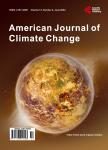Development of Environment Friendly Paddy Ecosystem for Sustainable Rice Farming through Soil Amendments with Biochar and Alternate Wetting-Drying Irrigations
Development of Environment Friendly Paddy Ecosystem for Sustainable Rice Farming through Soil Amendments with Biochar and Alternate Wetting-Drying Irrigations作者机构:Department of Environmental Science Bangladesh Agricultural University Mymensingh Bangladesh Department of Irrigation and Water Management Bangladesh Agricultural University Mymensingh Bangladesh
出 版 物:《American Journal of Climate Change》 (美国气候变化期刊(英文))
年 卷 期:2021年第10卷第4期
页 面:581-596页
学科分类:09[农学] 0903[农学-农业资源与环境] 090301[农学-土壤学]
主 题:CH4 Flux GWPs AWDI Yield Scaled CH4 Emission Dry Boro Rice Rainfed Aman Rice
摘 要:Climate change may badly affect the availability of water and soil nutrients to rice plant. Research experiments were conducted at the Environmental Science Departmental field, Bangladesh Agricultural University, Mymensingh during July 2017 to June 2019, to find out the suitable combination of biochar with inorganic fertilizers for minimizing seasonal yield scaled CH4 emissions, reducing global warming potentials (GWPs) and sustainable rice farming under feasible irrigation practices. There were ten experimental treatments with different combinations of inorganic NPKS fertilizers and biochar (15 - 30 t/ha) under conventional flooding (CF) and alternate wetting-drying irrigations (AWDI). This study revealed that NPKS fertilization (50% of the recommended doze) with 15 t/ha biochar amendments under AWD irrigation maximized rice yield 6750 kg/ha and 4380 kg/ha in dry boro and wet aman seasons respectively, while the lowest rice yield 1850 kg/ha and 1550 kg/ha were recorded in continuously irrigated control treatment (T1) during the dry and wet seasons respectively. Seasonal cumulative CH4 emission, yield scaled CH4 emission and GWPs were suppressed significantly with biochar amendments 15 - 30 t/ha under both conventional and AWDI irrigation systems during the wet and dry seasons of rice cultivation. Significant interactions were observed among biochar amendments and irrigation practices during the dry boro rice cultivation. Dry seasonal cumulative CH4 emissions were decreased by 14.7%, 18.9% and 24.8% with biochar amendments at 15 t/ha, 20 t/ha and 30 t/ha respectively under conventional irrigation;while cumulative CH4 emissions were reduced by 10.6%, 26% and 41.6% respectively, under AWDI system. Finally, total global warming potentials (GWPs) were decreased by 6% - 15%, 13% - 30% with biochar amendments under conventional and AWDI irrigations respectively, in wet season;while global warming potentials



